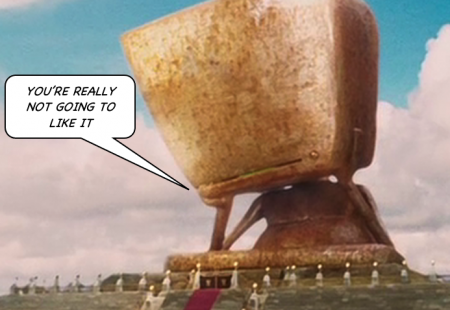The Ultimate Purpose
|
|
The real reason, long buried by screeds of HR’s wishful yogababble, that everyone, in any role, in any time or place, ever is needed for work: to create value for the owner. If we take it that the best concrete articulation of “abstract value” the species has yet invented is folding green stuff, you can boil The Ultimate Purpose down: start with some of your owner’s money and reliably make more of it.
But, “owner”: there’s a loaded term. So, be inclusive and define it broadly, for in any situation there will be many owners: shareholders, the boss, yourself, your self-worth, your family, the broader society, our children’s future, common sense, Gaia, whatever — and their respective interests will certainly conflict — that conflict, by the way, being a major propellant of the hooey that is modern corporate life — but if you look beyond what your thought leaders say your purpose is to something epochal, constant and unshifting, where this time it isn’t different — you can’t go too far wrong.
For, however confidently McKinsey might declare it, your purpose is not “to champion every client’s goals with passion and integrity, as if they were our own”, nor to “serve the world by making food people love”, nor to “transform lives through learning and growth,” but to make as much money as you can for your shareholders.
How you go about doing that is a means to that end. If championing your clients’ goals with passion and integrity — shoot me, by the way — leads to you losing your owners’ money, or making a worse return on it than you could have made doing something else, you shouldn’t do that.
Now your employer’s purpose statement may well be immeasurable, aspirational, voguish, optional horse-feed — probably will be, if Corporate Branding had anything to do with it; see above — but you can energise it, a bit, by tacking The Ultimate Purpose on the front of it and conjoining them with a “by”.
“To create value for the owner by ... ” and here, supply your marketing department’s chosen vacuity: “ ... bringing harmony to the world through the efficient allocation of derivative risk to those best positioned to bear it” or something fatuous like that.
This way you have a “pole star” to follow that gives you some cogent grounds for making business decisions.
Q: Will this bring harmony to the world?
A: YES!
Q: Does this efficiently allocate credit risk to those who can bear it?
A: [after some hesitation] YES!
Q: Will I make pots of reliable money for the shareholders doing this?
A: [a longer hesitation] ... um — depends on the assumptions underlying your value at risk model holding, which on 98% of all trading days they should do assuming [cont’d p 94] ... STOP NOW.
The point is not to disdain bitcoin, or environmental, social, and corporate governance, diversity and inclusion, or even “transforming lives through learning and growth” — all of these are magnificent aspirations (except bitcoin, which is just stupid) — but as “purposes” they are second-order derivatives of your actual purpose, which is, and always will be, making money for the owner. These corporate purposes are ways of illustrating how you will make that money, in ways that make it relevant, comprehensible and agreeable to the person on the Clapham bus. They should be commensurate with the Ultimate Purpose, but if they are not, they don’t trump it. They are not your purpose at all.
Modern management
The Jolly Contrarian is collecting books that observe that modern management has lost sight of this fundamental goal. Just as we get rather close to some turtles in the market (We’ve seem to have struck solid elephant on the “what is money, exactly?” question, for example), other ones, which not two decades ago were clear as a bell, are silting up. “What are we even here for?” is that kind of question.
To be continued, and viciously edited in the mean time
